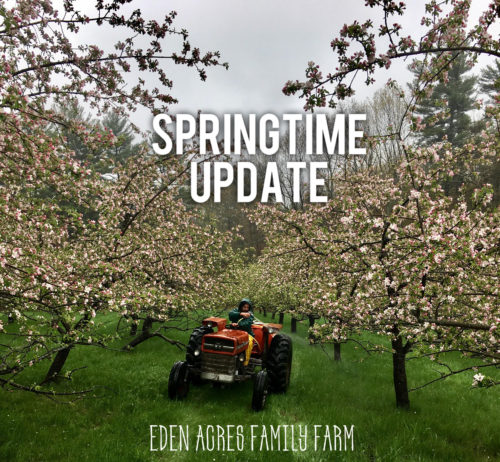 Spring brings rain and warmer temperatures. It also brings pests. So, it’s time to break out the organic measures for controlling tick populations and apple pests. One of our not-so-secret weapons that we use for the orchard is beneficial nematodes. Insects with a pupating or larval stage in the soil become susceptible to the insect-parasitic nematodes. The microscopic worm-like organisms seek out insects to host them as they mature and reproduce, killing the pests in the process. There are several species of nematodes that are parasitic to a variety of pests. We employ a triple threat to broaden the impact on pests such as curculio, apple sawfly, Japanese beetles, ants, and ticks. Timing is of importance when putting them down, however. Soil temperatures need to be above 45 degrees and should be wet since nematodes live in the water-filled pores within the soil. Drought conditions such as last year, could not sustain the nematodes. Thankfully, the abundance of snow this winter and recent rain has aided our efforts.
Spring brings rain and warmer temperatures. It also brings pests. So, it’s time to break out the organic measures for controlling tick populations and apple pests. One of our not-so-secret weapons that we use for the orchard is beneficial nematodes. Insects with a pupating or larval stage in the soil become susceptible to the insect-parasitic nematodes. The microscopic worm-like organisms seek out insects to host them as they mature and reproduce, killing the pests in the process. There are several species of nematodes that are parasitic to a variety of pests. We employ a triple threat to broaden the impact on pests such as curculio, apple sawfly, Japanese beetles, ants, and ticks. Timing is of importance when putting them down, however. Soil temperatures need to be above 45 degrees and should be wet since nematodes live in the water-filled pores within the soil. Drought conditions such as last year, could not sustain the nematodes. Thankfully, the abundance of snow this winter and recent rain has aided our efforts.
Bryan felt as though he was spraying magic pixie dust, so he added a brew of nitrogen and other nutrient fixing microbes to the nematode mixture for increasing soil fertility. It’s particularly interesting to note the 1960’s “discovery” of the effective microbes and philosophy of their founder, Dr. Teruo Higa. Dr. Higa’s research focused on combining microbial strains that were not believed to live together in the wild to see which ones could co-exist. All the microorganisms in the formula Dr. Higa created and used at Eden Acres Family Farm co-exist, co-prosper, exchange information, are sustainable, are safe, are efficient, are effective, and service each other. Dr. Higa believed that humans needed to learn from these microbes. We think so too!
What can we learn from beneficial microorganisms?
Symbiotic relationships are essential to our growing and changing world; a balance that can only be achieved by working together. What contributions are you currently making, or can offer to your community, to co-create a more prosperous culture?
One Love,
Ali
References:
http://articles.extension.org/pages/24726/soil-nematodes-in-organic-farming-systems
http://www.teraganix.com/Effective-Microorganisms-History-and-Availability-s/194.htm